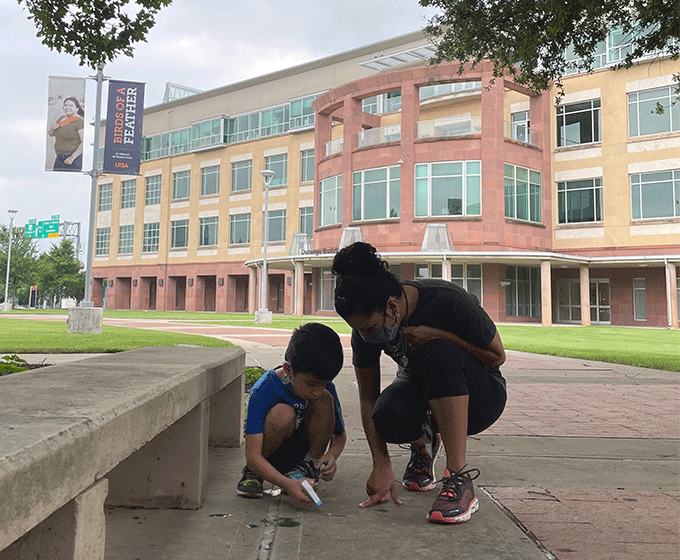
FEBRUARY 1, 2022 — The UTSA College of Education and Human Development is now accepting applications for summer and fall 2022 admittance to its Master of Science (M.S.) in Behavior Analysis program. The new degree program will prepare graduate students to become Board Certified Behavior Analysts (BCBA) who will provide support to people with and without disabilities such as autism in a variety of settings.
“Applied behavior analysis (ABA) is the science of human behavior. We leverage our science to support individuals of all abilities with expertise in serving those with developmental disabilities such as autism spectrum disorder,” said Leslie Neely, associate professor of educational psychology and ABA program director. “The need for BCBAs is extremely high and because of that, salaries are very competitive with an average starting salary between $65,000 to $70,000 per year. In fact, our field has more than doubled in the last five years, and there are still not enough BCBAs to meet the needs of the community.”
Becoming a BCBA requires three things: a master’s degree, approved coursework and 2,000 supervised fieldwork hours (i.e., hands on experience). The university’s new M.S. in behavior analysis offers coursework and supervised fieldwork (as needed) to put students in a position to sit for the certification exam. Because of the diverse needs of today’s students, the degree offers two concentrations—one comprehensive, one focused—allowing students to select the track that works best for them.
“The degree still offers the comprehensive program that provides a one-stop shop for our students interested in satisfying all of the requirements through UTSA. However, over the years we’ve realized some students need a little more flexibility,” Neely explained. “As a result, the new M.S. degree offers a focused concentration option to allow those students to complete the high-quality coursework through us, but gives them flexibility in identifying their own supervision site or even their own area of specialization.”
“One of the great things about this field and this job is that you can work as a BCBA in a variety of employment settings and with different individuals,” added Hannah MacNaul, assistant professor of educational psychology and program coordinator for the comprehensive concentration. “A majority of our students work as a BCBA in a clinic providing services to people with autism; however, we have many students who are employed with school districts, or provide services in homes. Because there are so many options, we try to ensure our students get the experiences that will prepare them for the job they want. Many of our students quickly progress into advanced professional roles because of the high-quality training obtained in the program.”
The behavior analysis program also offers a graduate certificate, which provides the required seven content classes. This option is best for individuals who already hold a master’s degree, or for those who simply want to understand behavior analysis to apply it in their current position.
“A number of our students in the certificate and focused option of the program are teachers, particularly special education teachers. Some already have a master’s degree, so they are just looking for the approved coursework,” said Marie Kirkpatrick, assistant professor of educational psychology and program coordinator for the focused concentration. “They enjoy the flexibility these options give them because they are working full-time in the classroom and applying what they’re learning in their coursework to better support their students.”
Students interested in learning more about the ABA program should visit the ABA at UTSA website or contact Leslie Neely at leslie.neely@utsa.edu.
UTSA Today is produced by University Communications and Marketing, the official news source of The University of Texas at San Antonio. Send your feedback to news@utsa.edu. Keep up-to-date on UTSA news by visiting UTSA Today. Connect with UTSA online at Facebook, Twitter, Youtube and Instagram.
Move In To COLFA is strongly recommended for new students in COLFA. It gives you the chance to learn about the Student Success Center, campus resources and meet new friends!
Academic Classroom: Lecture Hall (MH 2.01.10,) McKinney Humanities BldgWe invite you to join us for Birds Up! Downtown, an exciting welcome back event designed to connect students with the different departments at the Downtown Campus. Students will have the opportunity to learn about some of the departments on campus, gain access to different resources, and collect some giveaways!
Bill Miller PlazaCome and celebrate this year's homecoming at the Downtown Campus with food, games, giveaways, music, and more. We look forward to seeing your Roadrunner Spirit!
Bill Miller PlazaThe University of Texas at San Antonio is dedicated to the advancement of knowledge through research and discovery, teaching and learning, community engagement and public service. As an institution of access and excellence, UTSA embraces multicultural traditions and serves as a center for intellectual and creative resources as well as a catalyst for socioeconomic development and the commercialization of intellectual property - for Texas, the nation and the world.
To be a premier public research university, providing access to educational excellence and preparing citizen leaders for the global environment.
We encourage an environment of dialogue and discovery, where integrity, excellence, respect, collaboration and innovation are fostered.